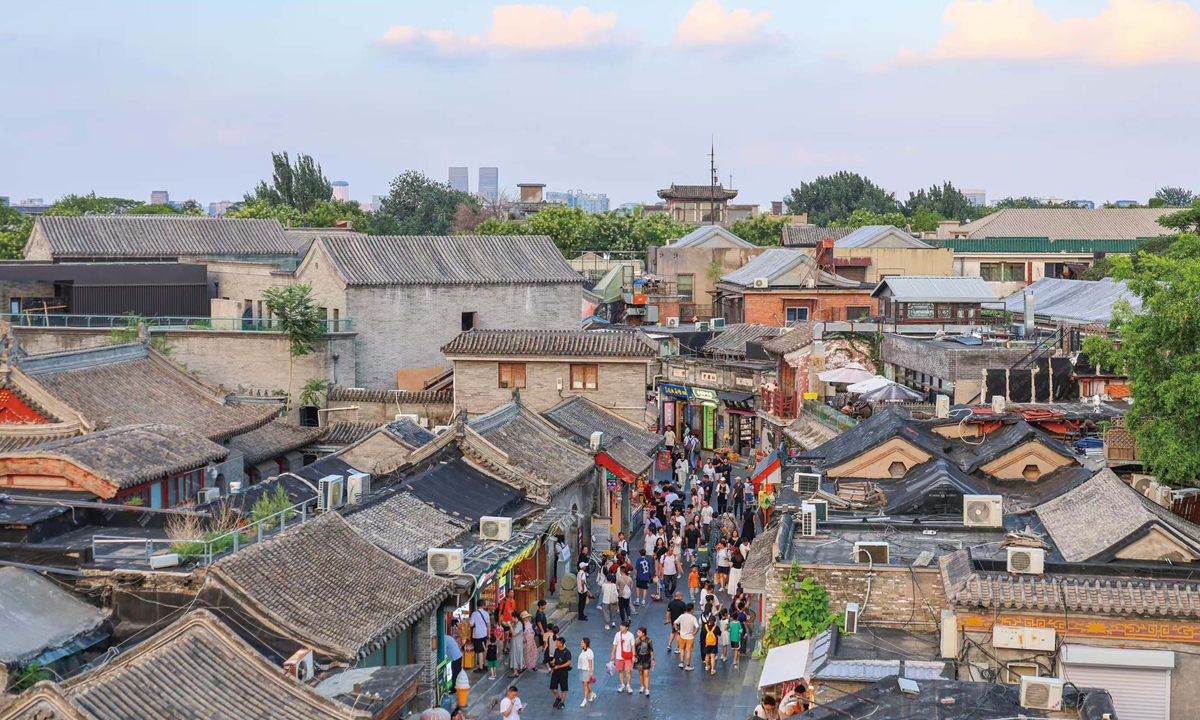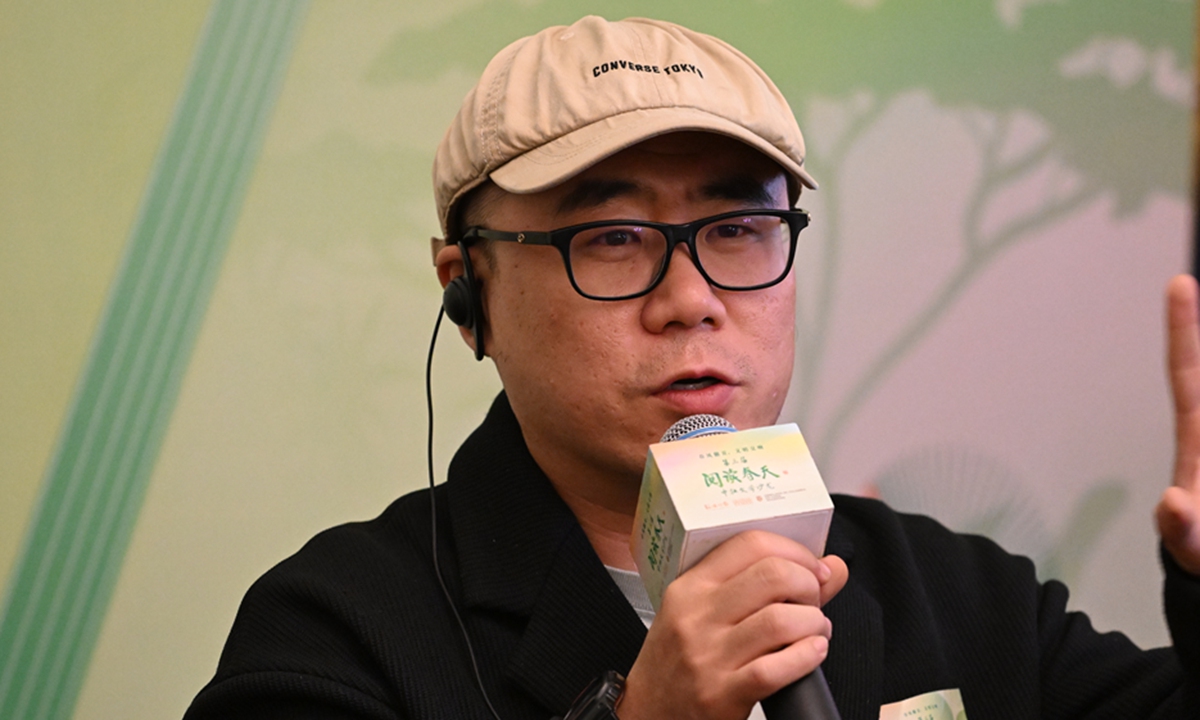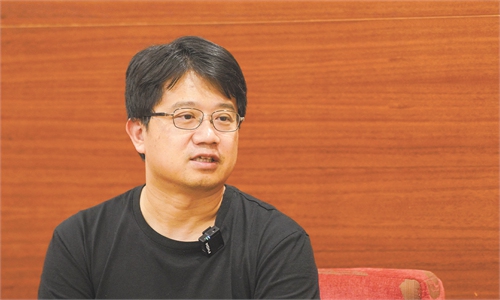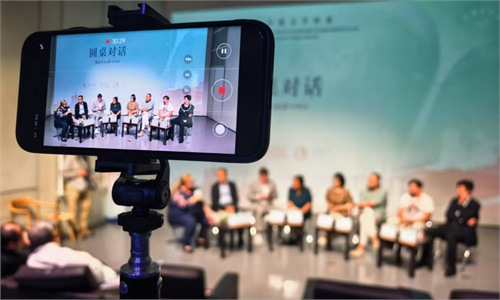ARTS / CULTURE & LEISURE
From hutong to skyscrapers – Shi Yifeng’s literary excavation of Beijing
Mapping soul of a city

People walk along a hutong in Beijing in July 2024. Photo: VCG
When Honoré de Balzac wrote of Paris, he declared that he could never exhaust its stories, never fully capture its labyrinthine streets or the infinite human dramas unfolding within. Today, Shi Yifeng, winner of China's Lu Xun Literary Prize, stands as a kindred spirit - one who has devoted his literary life to chronicling Beijing, confident that the city's stories are inexhaustible, and its people endlessly complex.
Yet, as Shi himself reflects, his writing has only "scratched the surface" of this sprawling city, and each new era brings forth fresh faces and fates for the novelist to pursue.
Shi's literary pursuits unfold against the vibrant backdrop of China's regional writing renaissance. From the poetic vastness of My Altay by Li Juan - representing the literature of the Northwest Frontier - to the revival of Northeast China's literature by authors like Shuang Xuetao and Ban Yu, contemporary Chinese letters are experiencing a flourishing of local voices.
What accounts for this resurgence? In the exclusive interview with the Global Times, Shi noted that the answer lies in the changing landscape of information in the digital age.

Shi Yifeng Photo:Chen Tao/GT
Art of observation
Shi's novels are renowned for their vivid sense of place. Asked how he makes Beijing's scenes so fresh and tangible, Shi admits that his creative philosophy begins with certainty. "A story must happen at a specific time and place. To make a character and an era convincing, you have to be sure of the environment that surrounds them." For Shi, this precision is not an affectation but a necessity - a writer's basic responsibility.
It helps that he is a lifelong Beijinger. "I have lived here for over 40 years. I know what the city's air tastes like, how the dust drifts, including the dryness of the wind. These are sensations I understand intimately."
While some stories - especially those about ordinary residents -draw from Shi's own encounters, many spring from imaginative empathy. "For a character like a police officer in the novel A Life for a Life, I have never been in his world. But I can speculate about what such a person's life is like, and build from there." Shi assembles personalities from the types he knows, rather than copying individuals directly. "There are people like this in real life, but not this exact person. My characters are composites, not copies."
In his works such as Fruit under the Red Flag, A Love Story in Beijing, A Life for A Life, and Farewell Grandpa, Shi crafts vivid, often bittersweet vignettes: A migrant fitness coach vying for discounted bread, a shrewd local matron locked in a battle of wits with the property management company. These tales, saturated with the Beijing dialect and local color, have come to define what critics call the "new Jingwei" (lit: New Beijing flavor) novel - a literary phenomenon both rooted in place and resonant with universal themes.
For him, Beijing is not merely a backdrop but a living organism, constantly shaped by the tides of history and the pulse of daily life. Shi is keenly aware that to write about Beijing is to write about the broader currents of Chinese society.
Despite his deep association with Beijing, Shi never fears running out of stories. "Beijing is too vast to be exhausted - its population is as large as some countries. I could write for a lifetime and still have more to discover." The city's constant evolution keeps his curiosity sharp. New professions, such as delivery workers and internet entrepreneurs, can always offer fresh perspectives.
Pulse of the era
As Beijing itself evolves rapidly under the globalization, technology, and social change, so too do the subjects of Shi's fiction. Shi's latest published work Yiri Dingliu (lit: One-day Celebrity) tries to explore the new face of Beijing in this new era, centered on a young Beijing man who unexpectedly becomes an online celebrity because of a live-streaming accident and delves into the question of what it means to be a person in the digital age. "At the core of his contemplation is the belief that we must ensure machines do not become more human-like than we are."
As the relationship between digital technology and humanity becomes a current topic for reflection and exploration, Shi's novels cover a wide range of internet-related themes. His works include stories about the lives of gaming experts and e-sports youths, like The Shot, which involves real-world VR games, as well as discussions on the connection between online popularity and self-worth, such as Yiri Dingliu, featuring an AI character called "Hui Xing."
Shi is perceptive to current changes; this is not only reflected in his creative work but also in his evaluations of China's regional writing ecology. "In today's information society," the writer noted, "places that once seemed far removed from our daily lives now appear constantly in the stream of news, social media, and entertainment. This proximity stirs the curiosity of readers, prompting them to seek out literature as a window into these 'other places.'" The concept of "place" once marked by distance, now becomes a source of fascination and self-reflection too.
Shi argues that whether one writes about Beijing, Northwest China, or Northeast China, there is a shared resonance at the level of the times. "Both resonance and difference exist. Beijing is unique—what is normal here might be eccentric elsewhere. But in the end, we are all living in the same era, and that creates shared echoes," the writer said.



